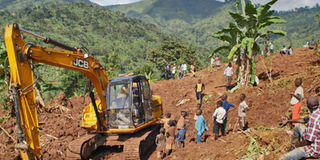Museveni orders landslide victims to relocate from disaster-prone areas

An excavator digs through mud in search for bodies of those who perished in the landslides in Bududa District yesterday. PGOTO BY LEONARD MUKOOLI
President Museveni yesterday faulted Ugandans that have settled in wetlands and other disaster-prone areas and ordered that they vacate to safe areas.
Mr Museveni, who condoled with families of the deceased, announced that they are considering compensating the victims with cash to expedite the evacuation process.
“These losses, on account of floods and landslides, are, mainly, due to the mistake of insisting on settling in areas that logic and God did not intend for human habitation,” President Museveni said in a statement.
“These are the wetlands and steep mountains of 31-32 per cent gradient or more than that. All people in such areas should accept resettlement as we have done with the previous Bududa victims that are now settled in Bulambuli District,” he said.
He reminded those cultivating in wetlands to switch to fish-farming “as we have done in Limoto Wetland, Pallisa District.”
President Museveni yesterday delivered the message to Ugandans via his Facebook page upon his return from Nairobi, Kenya, where he had gone to attend the African, Caribbean, and Pacific (ACP) Group of States Summit.
His comments come eight days after more than 20 people perished in floods and landslides in Bundibugyo District and 16 others in the Mt Elgon Sub-region in the mountainous districts of Sironko and Bududa.
He said the ongoing government mode of constructing houses for and relocating flood victims is taking long, and that they are considering cash allocations to expedite the process.
“In order to expedite the evacuation of threatened people, we may have to look at only cash compensation instead of the protracted process of resettlement, which involves the allocation of planned farms and permanent houses, among others as seen in Bulambuli,” President Museveni said.
“With cash, people can then go and fend for themselves. The swamps and steep mountains are not for crops and human settlements. The swamps are for water, ebigugu (cyperus latifolia) and papyrus (cyperus papyrus) and uninterrupted swamp water is for irrigation,” he added.
He said the swamp grass helps in the formation of rain through transpiration while the tree-roots and the dropping leaves form a soft bed on the forest floor and slows down the speed of running water and forces the water to sink in the soil, thereby replenishing the water-table underground.
“Forests and vegetation along steep mountains use their roots to hold the soil and also act as a cushion for raindrops hitting the soil so that rain and the run-off water (omutuunga, omukoka, alele) does not sweep the soil, causing soil erosion and, eventually, landslides,” he said.
He promised to intensify a campaign for the Environment Resettlement Fund “so that those who were misled by the government to go to the wetlands in the 1960s are compensated to get out” asking the recent encroachers.



